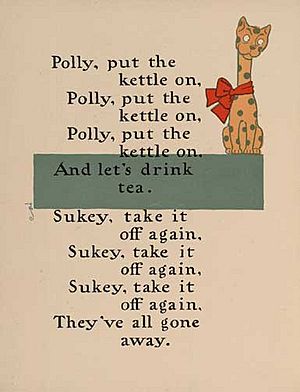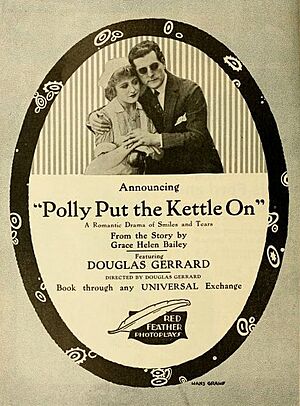Polly Put the Kettle On facts for kids
Quick facts for kids "Polly Put the Kettle On" |
|
|---|---|

William Wallace Denslow's illustrations for Polly Put the Kettle On, from a 1901 edition of Mother Goose
|
|
| Nursery rhyme | |
| Published | 1803 |
"Polly Put the Kettle On" is a very well-known English nursery rhyme. It's a song that many children learn and sing. This rhyme is listed in the Roud Folk Song Index as number 7899. This index helps keep track of folk songs and rhymes from around the world.
Contents
About "Polly Put the Kettle On"
This popular rhyme tells a simple story about preparing for tea. It features two characters, Polly and Sukey. The song is often sung in schools and homes. It has been enjoyed by generations of children.
What are the lyrics?
The most common modern lyrics for "Polly Put the Kettle On" are:
- Polly put the kettle on,
- Polly put the kettle on,
- Polly put the kettle on,
- We'll all have tea.
- Sukey take it off again,
- Sukey take it off again,
- Sukey take it off again,
- They've all gone away.
Where did the song come from?
The song "Polly Put the Kettle On" has a long history. A very similar song was first published in London in 1803. It was called "Molly Put the Kettle On or Jenny's Baubie." Other versions were printed in Dublin and New York around the same time.
The rhyme is mentioned in a famous book by Charles Dickens called Barnaby Rudge. This book was written in 1841. This is the first time we see the lyrics written down exactly as we know them today.
What do the names mean?
In the mid-1700s, names like "Polly" and "Sukey" were common nicknames. "Polly" was a popular short form for the name Mary. "Sukey" was a common nickname for Susan. These names were often used in families during that time.
The song's tune
The tune for "Polly Put the Kettle On" is called "Jenny's Baubie." This melody has been around since the 1770s. It sounds a bit like another famous song, "Oh du lieber Augustin." That song was first published in Germany in 1788 or 1789.


